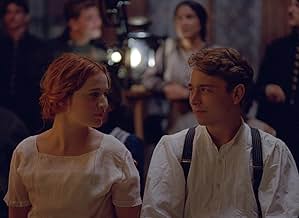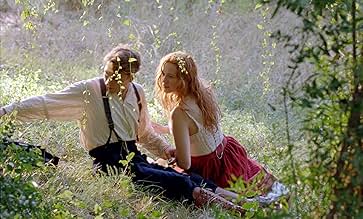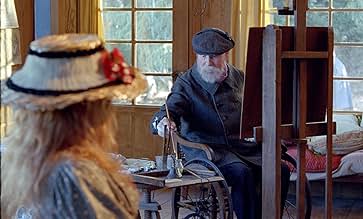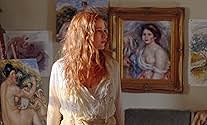CALIFICACIÓN DE IMDb
6.5/10
6.1 k
TU CALIFICACIÓN
En el verano de 1915, Jean Renoir, hijo del pintor impresionista Pierre-Auguste, vuelve a casa tras ser herido en la guerra. Andrée es la joven revivirá tanto al hijo como al padre.En el verano de 1915, Jean Renoir, hijo del pintor impresionista Pierre-Auguste, vuelve a casa tras ser herido en la guerra. Andrée es la joven revivirá tanto al hijo como al padre.En el verano de 1915, Jean Renoir, hijo del pintor impresionista Pierre-Auguste, vuelve a casa tras ser herido en la guerra. Andrée es la joven revivirá tanto al hijo como al padre.
- Dirección
- Guionistas
- Elenco
- Premios
- 3 premios ganados y 11 nominaciones en total
Anne-Lise Heimburger
- La boulangère
- (as Annelise Heimburger)
Thierry Hancisse
- Le brocanteur
- (as Thierry Hancisse de la Comédie Française)
Cécile de Moor
- Servante Collettes
- (as Cecile Rittweger)
Opiniones destacadas
This is without question one of the most beautiful movies I have ever seen. The photography, especially the scenes outdoors, looks like one early Renoir painting after the next. The colors are vivid and lush, and the greens are varied to the nth degree. You could watch this movie with the sound turned off and still have a great time.
Which is not to say that the script and acting are not worth paying attention to. The story is nothing special: During the last years of his life, during World War I, Renoir lived in the South of France, to avoid the German invaders. There he paints a beautiful young woman, whom we get to see in the altogether rather often, to pleasing effect. (The movie never explores the extent to which this has an erotic aspect for Renoir, but since it is made clear that he ended up sleeping with his previous models, we can assume that. He is not just painting rose and pink. He keeps emphasizing that he is painting flesh.) His middle son, Jean (who will be the famous French film director down the road), comes home from the war on sick leave and eventually falls in love with the new model. That doesn't go particularly well, as she doesn't seem very committed to monogamy with him.
The youngest son, Claude (named after Monet), doesn't deal well with his Mother's recent death, or his distant relationship with Renoir. That doesn't get explored very deeply either.
So, in effect, the story threads are handled very Impressionistically as well: little touches of them here and there, but no detailed analysis.
The music is often very beautiful, so don't turn off the sound.
Don't expect great drama here. The acting is all fine, but there are no in-depth character portraits here - as there are not in Renoir's paintings - and no real drama. It is all very impressionistic, and often in a very beautiful way.
See this in a theater if you can. I suspect it will lose a lot reduced to even a 64" TV screen.
------------------------------
I just saw it for a second time, this time on my 46" TV screen. Yes, it does lose a lot, but the color and light are still beautiful. It's a must see movie, but as I wrote before, don't expect much in the way of drama.
Which is not to say that the script and acting are not worth paying attention to. The story is nothing special: During the last years of his life, during World War I, Renoir lived in the South of France, to avoid the German invaders. There he paints a beautiful young woman, whom we get to see in the altogether rather often, to pleasing effect. (The movie never explores the extent to which this has an erotic aspect for Renoir, but since it is made clear that he ended up sleeping with his previous models, we can assume that. He is not just painting rose and pink. He keeps emphasizing that he is painting flesh.) His middle son, Jean (who will be the famous French film director down the road), comes home from the war on sick leave and eventually falls in love with the new model. That doesn't go particularly well, as she doesn't seem very committed to monogamy with him.
The youngest son, Claude (named after Monet), doesn't deal well with his Mother's recent death, or his distant relationship with Renoir. That doesn't get explored very deeply either.
So, in effect, the story threads are handled very Impressionistically as well: little touches of them here and there, but no detailed analysis.
The music is often very beautiful, so don't turn off the sound.
Don't expect great drama here. The acting is all fine, but there are no in-depth character portraits here - as there are not in Renoir's paintings - and no real drama. It is all very impressionistic, and often in a very beautiful way.
See this in a theater if you can. I suspect it will lose a lot reduced to even a 64" TV screen.
------------------------------
I just saw it for a second time, this time on my 46" TV screen. Yes, it does lose a lot, but the color and light are still beautiful. It's a must see movie, but as I wrote before, don't expect much in the way of drama.
10Red-125
Renoir (2012) written and directed by Gilles Bourdos, tells the story of the aging painter Pierre-Auguste Renoir (Michel Bouquet), his young model Andrée (Christa Theret), and his son Jean (Vincent Rottiers).
Andrée is a free spirit. She has no problem posing in the nude, but she makes it clear to everyone that she is a paid model. She has no intention of posing for the honor of it, nor is she ready to become a cook or a maid, as have other models before her.
Naturally, Jean is drawn to the beautiful young woman, and the plot revolves around the relationships among and between the three main characters.
This is an extraordinarily beautiful movie, filmed on the scenic Côte d'Azur. War is raging elsewhere in France, but life is peaceful in this region. The pace of the film reflects the pace of life at the time--quiet and slow.
This is a film worth seeing, based on historical fact, and suggesting what motivated the younger Renoir to become the extraordinary film director that he was. For some reason, the IMDb weighted average of this film is a dismal 6.6. (The ratings themselves are much higher, but the weighting system brings the number down.) Don't be discouraged by the low rating. This is a movie worth seeking out and seeing. It will work better in a theater, but, if necessary, see it on DVD. It will repay your viewing.
Andrée is a free spirit. She has no problem posing in the nude, but she makes it clear to everyone that she is a paid model. She has no intention of posing for the honor of it, nor is she ready to become a cook or a maid, as have other models before her.
Naturally, Jean is drawn to the beautiful young woman, and the plot revolves around the relationships among and between the three main characters.
This is an extraordinarily beautiful movie, filmed on the scenic Côte d'Azur. War is raging elsewhere in France, but life is peaceful in this region. The pace of the film reflects the pace of life at the time--quiet and slow.
This is a film worth seeing, based on historical fact, and suggesting what motivated the younger Renoir to become the extraordinary film director that he was. For some reason, the IMDb weighted average of this film is a dismal 6.6. (The ratings themselves are much higher, but the weighting system brings the number down.) Don't be discouraged by the low rating. This is a movie worth seeking out and seeing. It will work better in a theater, but, if necessary, see it on DVD. It will repay your viewing.
Painter Pierre-Auguste Renoir (Michel Bouquet) is an ancient man by 1915. It is WWI, and his two eldest sons, Pierre and Jean (Vincent Rottiers), are at war, while his youngest, Claude (Kid with a Bike star Thomas Doret), just a boy, plays around the estate, claiming to be an orphan (his mother dead and his father an old man). Along comes a beautiful young woman (Christa Theret) who wishes to model for Renoir. Her beauty inspires the old man. Soon, Jean arrives home and begins an affair with the model (whose name is Andrée Heuschling, but who would later change her name to Catherine Hessling and star in many of Renoir's early films). This is, above all, just a very pretty movie. Very fitting, given its subject. Alexandre Desplat also provides a very gorgeous score. The story isn't hefty, but it's good. The acting is good throughout. France submitted this for the Academy Awards this year, bypassing the much more popular (and frankly better) Blue Is the Warmest Color, but Renoir is a worthy film, as well.
The moment the film opens, you are immersed in the countryside of southern France. The colours are warm and very expressive. In fact the film is shot very much as a painting in itself, which is quite beautiful. All natural light. You want to relax and soak it all in, but there is a thread of tension that moves throughout. As "the boss" says, life is like a cork and you have to follow it where it leads you. For Renoir himself, the flesh and its immediacy is all important. It must be seized and exalted in that very moment. For his son Jean, he feels the need to go back to war, a higher calling as it were. He falls for the spell of his father's model Andrée. You constantly feel the tension between the privilege of the "Chateau" and the needs of the flesh for life to continue. A visual experience.
Renoir (2012)
So promising. And so beautiful without depth. See it if you love beautiful, patient (aka slow) movies. It's set in the French countryside during WWI, and is filled with loving scenes of the fields and woods and streams there, drenched in gorgeous light. And it is filled in wonderful interiors, day and night, including some lovemaking. And it is filled frank nudity, in the name of art.
You see, the main character, which should have been the name of the movie, is the model of the great Impressionist painter
But late Renoir compared to early Renoir—that is, late works by the painter compared to early works by the filmmaker—are no contest. One artist is checking out, and leering and relaxing. The other is striving and incomplete, entering a new medium and a new age. History might say that the father was more important overall, and I agree that some of his early paintings are monstrously perfect. But by the 20th Century, some 30 or 40 years after his heyday, it's another story, and his studies, many of them nudes, are weak and indefinite. I teach art history, which is no great claim, but I study and look at this stuff all the time, and late Renoir is to be avoided!
Not so early Renoir, the son, the film director. By 1939 Jean had made one of the truly great masterpieces of the period, in any medium: "Rules of the Game," as it's called in English. It gives away his own familiarity with the rich and cultured world of France before WWII. It gives away what he disdained about his upbringing, in fact, as he critiques it in the film, with a laugh and some true pathos. That's 20 years after what you see here, but this is a film site, and if you want to connect the dots, see that one.
But look, this isn't a documentary, it's a movie, a bio-pic in a way, lush as it is. And it's slow. It avoids actual depth and substitutes profound (and often touching) commentary. It resides in the color and light and smoke made during the filming, which isn't really the point—except for the flimmakers. In a way I'd say it conjurs up the time, in a precious and empty way, very well. No contradiction intended. It won several best costume awards.
But be prepared. If you love art and love Renoir, you'll be disappointed, in the end. (The paintings in the film were made by a notorious forger.) If you just love beautiful films to get lost in, this might do the trick. It's immersive. And it does remind us of the real depths of the original Impressionists and their love of light, and their love of life. That's the real point here. What is the true interest—the beginning of the son's film career, is left a footnote.
So promising. And so beautiful without depth. See it if you love beautiful, patient (aka slow) movies. It's set in the French countryside during WWI, and is filled with loving scenes of the fields and woods and streams there, drenched in gorgeous light. And it is filled in wonderful interiors, day and night, including some lovemaking. And it is filled frank nudity, in the name of art.
You see, the main character, which should have been the name of the movie, is the model of the great Impressionist painter
But late Renoir compared to early Renoir—that is, late works by the painter compared to early works by the filmmaker—are no contest. One artist is checking out, and leering and relaxing. The other is striving and incomplete, entering a new medium and a new age. History might say that the father was more important overall, and I agree that some of his early paintings are monstrously perfect. But by the 20th Century, some 30 or 40 years after his heyday, it's another story, and his studies, many of them nudes, are weak and indefinite. I teach art history, which is no great claim, but I study and look at this stuff all the time, and late Renoir is to be avoided!
Not so early Renoir, the son, the film director. By 1939 Jean had made one of the truly great masterpieces of the period, in any medium: "Rules of the Game," as it's called in English. It gives away his own familiarity with the rich and cultured world of France before WWII. It gives away what he disdained about his upbringing, in fact, as he critiques it in the film, with a laugh and some true pathos. That's 20 years after what you see here, but this is a film site, and if you want to connect the dots, see that one.
But look, this isn't a documentary, it's a movie, a bio-pic in a way, lush as it is. And it's slow. It avoids actual depth and substitutes profound (and often touching) commentary. It resides in the color and light and smoke made during the filming, which isn't really the point—except for the flimmakers. In a way I'd say it conjurs up the time, in a precious and empty way, very well. No contradiction intended. It won several best costume awards.
But be prepared. If you love art and love Renoir, you'll be disappointed, in the end. (The paintings in the film were made by a notorious forger.) If you just love beautiful films to get lost in, this might do the trick. It's immersive. And it does remind us of the real depths of the original Impressionists and their love of light, and their love of life. That's the real point here. What is the true interest—the beginning of the son's film career, is left a footnote.
¿Sabías que…?
- TriviaOfficial submission of France to the Oscars 2014 best foreign language film category.
- ErroresWhen Pierre-Auguste walks in on Jean Renoir being bathed, a modern toggle-style light switch is visible on the wall. The toggle switch wasn't invented until 1917, which is a few years after that part of the film. Earlier light switches were push-button style, and the switch on the wall is also of a modern plastic style that is very much later.
- Citas
Pierre-Auguste Renoir: You're rather modest for an actress.
Andrée Heuschling: Actress doesn't mean whore.
- ConexionesFeatured in Fandor: Cannes You Dig It? | Fandor Spotlight (2022)
- Bandas sonorasShimmy Dédée
By Patrick Artero
Performed by Patrick Artero, Philippe Baudouin, Francis Guero, André Neufert and Michel Queraud
Selecciones populares
Inicia sesión para calificar y agrega a la lista de videos para obtener recomendaciones personalizadas
- How long is Renoir?Con tecnología de Alexa
Detalles
- Fecha de lanzamiento
- País de origen
- Sitio oficial
- Idiomas
- También se conoce como
- 印象雷諾瓦
- Locaciones de filmación
- Productoras
- Ver más créditos de la compañía en IMDbPro
Taquilla
- Total en EE. UU. y Canadá
- USD 2,293,798
- Fin de semana de estreno en EE. UU. y Canadá
- USD 65,194
- 31 mar 2013
- Total a nivel mundial
- USD 7,816,573
- Tiempo de ejecución1 hora 51 minutos
- Color
- Mezcla de sonido
- Relación de aspecto
- 1.85 : 1
Contribuir a esta página
Sugiere una edición o agrega el contenido que falta

































